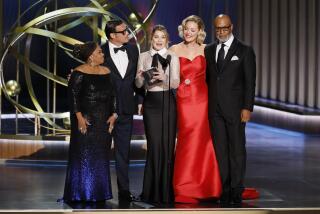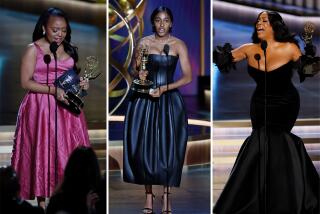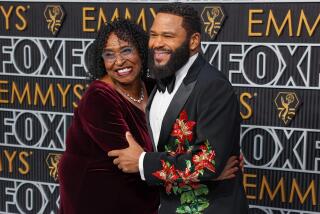Emmy Round Table: Comedy: Content is king and these days everyone can play, actors say
The Television Academy recently defined a comedy as a 30-minute show in terms of entering the Emmy Awards race. And while it has granted exceptions to the new rule, how does one really define comedy? And are comedies as beholden to audiences as dramas to present real world issues, to deal in challenging subject matter?
Those are questions that were tackled in this year’s Emmy Roundtable when Anthony Anderson (“black-ish”), Billy Crystal (“The Comedians”), Danny DeVito (“It’s Always Sunny in Philadelphia”), Anna Faris (“Mom”) and Jeffrey Tambor (“Transparent”) got together to talk about television then and now.
Here are edited excerpts from that spring conversation.
FULL COVERAGE: Emmys 2015
Everything has changed because we have these dramas that are funny and we have these comedies that are very serious — when you signed on for “Transparent” Jeffrey, did you think of it as a comedy?
Jeffrey Tambor: I think we can all attest, you never think of it, you just—I read that thing and I just said, “I have to do it.” And I do remember laughing but I also remember being terribly affected and knowing that this was a role of a lifetime. I all but threw myself at these people. Comedy, drama, whatever, I just knew it was great. I think what’s happening in culture now is everything is mixing and —there’s always a plié in comedy, you know, there’s always a serious bent to it.
Danny DeVito: Wait, did you just say there was always a what in it?
Anthony Anderson: A plié, he went to ballet—
Billy Crystal: Like French, he went—
Anderson: He didn’t go French; he went dance.
Anna Faris: I grew up in the Seattle area, and I did local theater. Never any comedy. And my first job here was “Scary Movie” and I was in the comedy world, never to come out of it sadly — which has been a degree of frustration to me. I was so naive with how this industry defined comedy and drama. And for somebody who sort of viewed themselves as an actor and my approach to both ideas is the same. For me, it’s sort of sincerity of character. I still feel frustrated with how arbitrary it all seems. I feel like it does a disservice to our audience members and to us as actors and to the industry as a whole, to have such rigid ideas of one or the other, because nothing is that simple.
Anderson: Were you prepped before you got here?
[laughter]
“Mom” is in some ways a very traditional comedy, multi-cam and the big laughs. But you deal with many serious subjects — cancer and giving up a child for adoption, and alcoholism, and all that. When you signed on did you know it was going to be that dramatic?
Faris: No, but the pilot was quite dark and I loved that—especially as a woman, you don’t read too many roles that are very dimensional. And I loved that she is a character who has a lot of struggle. So much of the past work I’ve done, even though it’s been in a lot of silly comedies, there’s usually a love interest that my character is maybe chasing and that is not only exhausting but it also can leave you with only one sort of dimension. I love that it was a very rounded show.
DeVito: I think it’s—there’s a serious effort, it looks like anyway, from the shows—I’m watching your shows. I can’t wait to see Billy’s show. But it seems like behind the scenes, there’s a serious effort for people to make the show about something. So it’s, like, you guys are dealing with—in “black-ish,” you’re pushing all kinds of buttons. [To Tambor] You for sure are. [To Faris] You are too. So whatever we call it, we’re in these shows that are pretty damn funny, some of them, but underlying, I think there’s an effort from the people that are putting them together – the networks, the internet things, the cable stations — there’s an underlying desire to give the audience a little bit more than just something to joke around with.
Faris: Chuck Lorre, who creates our show, I think his goal and his philosophy is that the stronger the emotional investment the audience has, the bigger the laughs will be. The idea is that the end product is more rewarding because you are relating to true characters that you root for on some level.
Tambor: And with streaming, what is happening is content is coming back again and sort of content is king. It reminds me a little bit of what Off-Broadway was to Broadway. As Danny was saying, you can go a little further. You can write almost novelistically now because audiences are binging rather than watching one at a time. It’s almost like reading chapters. It’s very freeing and a lot of writers are coming over to it, and directors and performers.
There’s a directness to the comedy now and the idea of it being about something as opposed to it being about nothing, which was the “Seinfeld” mold that everybody then copied for a while. “Black-ish” directly addresses issues of race. Is that what interested you? Because it’s also about a million other things — it’s a wonderful family show. It’s a very strong show about marriage.
Anderson: Right. Those were all ideas and concepts that were at the forefront when Kenya Barris and I were conceiving our show, and it’s a bit personal for us as well. You know, Kenya being from Inglewood, California; me being from Compton, California; being, you know, first generation successful in our families; being the only African Americans in our neighborhood now and one of the few African Americans in our private schools independently of one another. Those are things that we wanted to tackle as a show. And, you know, because it’s the American Dream we’re telling from a black perspective but we’re also telling it from a comedic perspective, but it’s also going to spark that conversation around the water cooler the day after you see our show. That was our intent.
Tambor: You can get ideas that are difficult and confrontative across with humor. With our show, there are heavy stakes, nothing less than — basically our show asks the question, “If I change, will you still be there? Is your love based on gender?” And these are big questions but there’s a big humor and there’s also a Jewish humor to the Pfefferman family.
Billy, I know you’re at a little disadvantage since at the time of this gathering your show hasn’t aired but I have seen some of it and it’s wonderful. It deals directly with the old comedy versus the new comedy because it’s about a version of yourself doing a show with a version of Josh Gad, and the conflict that comes. He’s more non-sequitur humor and your character is more traditional.
Crystal: The ironic comic.
How did that show come into being?
Crystal: This Swedish company sent me this show that they had produced in Sweden. And with all due respect to the country, I don’t think of that place as the comic foundry… But the concept was just so easy and right, a veteran comedian teamed with a younger guy to do a late-night sketch show. They don’t think they need each other but they do, and they sort of resent each other for needing each other. It’s very much like a two-handed “Larry Sanders Show,” which is still one of the great shows of all time.
But the decision was… I have to play myself. Josh and I said, we should play ourselves because that’s what’s going to make it really dangerous, because we’ll have to poke fun at ourselves, we’ll have to take jabs at our own persona, our own work, what people think of us. You get stuff that talks about you personally or something that you’ve done and you go, “That’s a little too far. Is this what they really think about me?”
[laughter]
Have there been moments where it has gotten a little too close to reality?
Crystal: Yeah, there’s an awkwardness about the show that I love. And a lot of the funniest moments are when we don’t say anything. It’s reactions. I love to react. I mean, Danny and I did a movie 28 years ago, 29 years ago? “Throw Momma from the Train” where we just had a great time, where we don’t have to say anything. And we loved that because we were schooled, in working in our early days in television, with great comedy forces, whether it be Jim Brooks or just being around the cast of “Taxi.” It’s just a certain way and style of working. So yeah, there’d be times where Josh and I would say, “You know, I do love you. Just, you know, this is the other me saying this.”
A lot of you have been in television for a long time. What do you think is the biggest thing that’s changed about television comedy in the last five or 10 years? I mean, you talk about “Taxi,” you talk about those great shows, “Soap,” “Garry Shandling,” “The Larry Sanders Show.”
Crystal: Well, look how far we’ve come. If I played the first gay character in a television series starting in 1977 [on “Soap”], [gestures to Tambor] look how far we’ve come and welcomed that. You know what I mean? So it’s, like, first of all, there’s so much more comedy than before.
DeVito: Yeah, and I—in 1978, I played the first black character on television and uh… [gestures to Anderson]
Anderson: Look at us now. Now [entertainment news website Deadline Hollywood] says the pendulum has swung too far to the right, all thanks to you!
[laughter]
DeVito: It’s my fault. I’ll take the heat.
What did you think of that?
Anderson: I found it interesting because I’d never heard anybody say that the pendulum had swung too far before this, before minorities were given the opportunities that they’re given now to be on network television. I found it a very interesting read and for someone to even go that far to say that… You know, we all deserve an opportunity and for so long, the opportunities were few and far between … I found it very insulting, that someone would write that about the pendulum swinging too far.
Crystal: What is it? I’m sorry, I didn’t see it—
DeVito: I never read that either. What is it?
There was an article on Deadline saying—”Has the pendulum swung too far in terms of people of color being on television?” It quoted some anonymous casting agents saying that now they were being required to cast minorities or people of color to hit certain quotas.
DeVito: We did a great show about this. We were doing a thing, the two of them were walking down the street, one of them’s eating—
Crystal: Because you don’t remember their names?
DeVito: No, I don’t know them.
[laughter]
DeVito: They’re talking about the planet and how they’re going to save the planet and one of them, in the middle of this, you know, platitude, they throw a wrapper on the ground. And the other one goes, “Look at this, look, this is the problem ... Pick it up.” He picks it up, goes to a Dumpster, opens the Dumpster to throw it away, and there’s a baby inside.
Oh my god, I remember that one.
DeVito: OK, so they get the baby, “What are we going to do with it?” “We’ve got to give it to Social Services. You’ve got to do something.” “No, no, no, I want to keep it.” “We can’t keep a baby. We’re going to raise a baby in a bar?” “You know what? A lot of babies, people bring them on television, they do commercials, and we can make some money.” So they go to an agent with the baby. The baby is this adorable, like, Gerber baby and the woman says, “Mm, yes, the baby’s adorable but we’re leaning a little bit toward the babies of color these days.”
[laughter]
DeVito: So we take the baby back to the bar and we paint it. And the whole plot of the show is, like, there’s a sword involved that Charlie and I are fighting over and blah-blah-blah, and he’s hiding it in the bar. The last shot, the Social Service people are onto them now with the baby, the baby is sitting on a table in the middle of the bar, Charlie and I are fighting over a saber that’s right over the kid’s head, and they are putting shoe polish on the baby. And the people walk in. We dealt with that subject.
[laughter]
Do you feel like it’s more social attitudes have changed—
Tambor: I’ll tell you one change that’s thrown me completely is you’ll debut, they’ll push a button on a Friday, and on Sunday you get tweets or emails saying, “Oh, we’ve seen the whole season. What’s next?” There are more opportunities for young actors and young creative people than there’s ever been.
It seems like there’s more opportunity for older actors as well because we’ve gone away, particularly in comedy, from the young group of people, Now it’s multi-generation where it’s mom and grandmom and the kids. Anthony was talking about it with people of color but women too. A few years ago, it was like Tina Fey was the only woman on television.
Faris: I’ve had so many, in the most amazing way, moments this last season of “Mom” where there will be six women, all of us are over 35, and we’re not in bikinis, and we’re not talking about men. It just feels like, “I don’t think this has ever happened.” And I’m so grateful that I get to act with these incredible women. And I think once it’s happening to you, you hadn’t realized—at least I hadn’t quite realized just how rare it is.
DeVito: Do you have a lot of women writers on your show?
Faris: We do but we also have a lot of male writers.
DeVito: I remember with “Taxi,” Marilu [Henner] was the only woman on the show. We did gang shows and we did shows about all the individual characters, but I always felt like it was weak in Marilu’s end of it. Like, with our show we have Kaitlin Olson who’s one of the funniest women on television today. I mean, she’s swallowed up with all the craziness that we do, but she’s in there and she gets some really serious stuff to do. They write for her. But I think it not only is writers but also there’s a lot more women directors.
I’m just saying, it’s like, look at the entire country. We’re steeped in racism, we’re steeped in sexism. We’ve got this kind of locked off mental attitude about the people in our country and in the world. So, I mean, if you think about it, hats off to the shows that are doing things that are making a little bit of a headway.
More to Read
From the Oscars to the Emmys.
Get the Envelope newsletter for exclusive awards season coverage, behind-the-scenes stories from the Envelope podcast and columnist Glenn Whipp’s must-read analysis.
You may occasionally receive promotional content from the Los Angeles Times.






